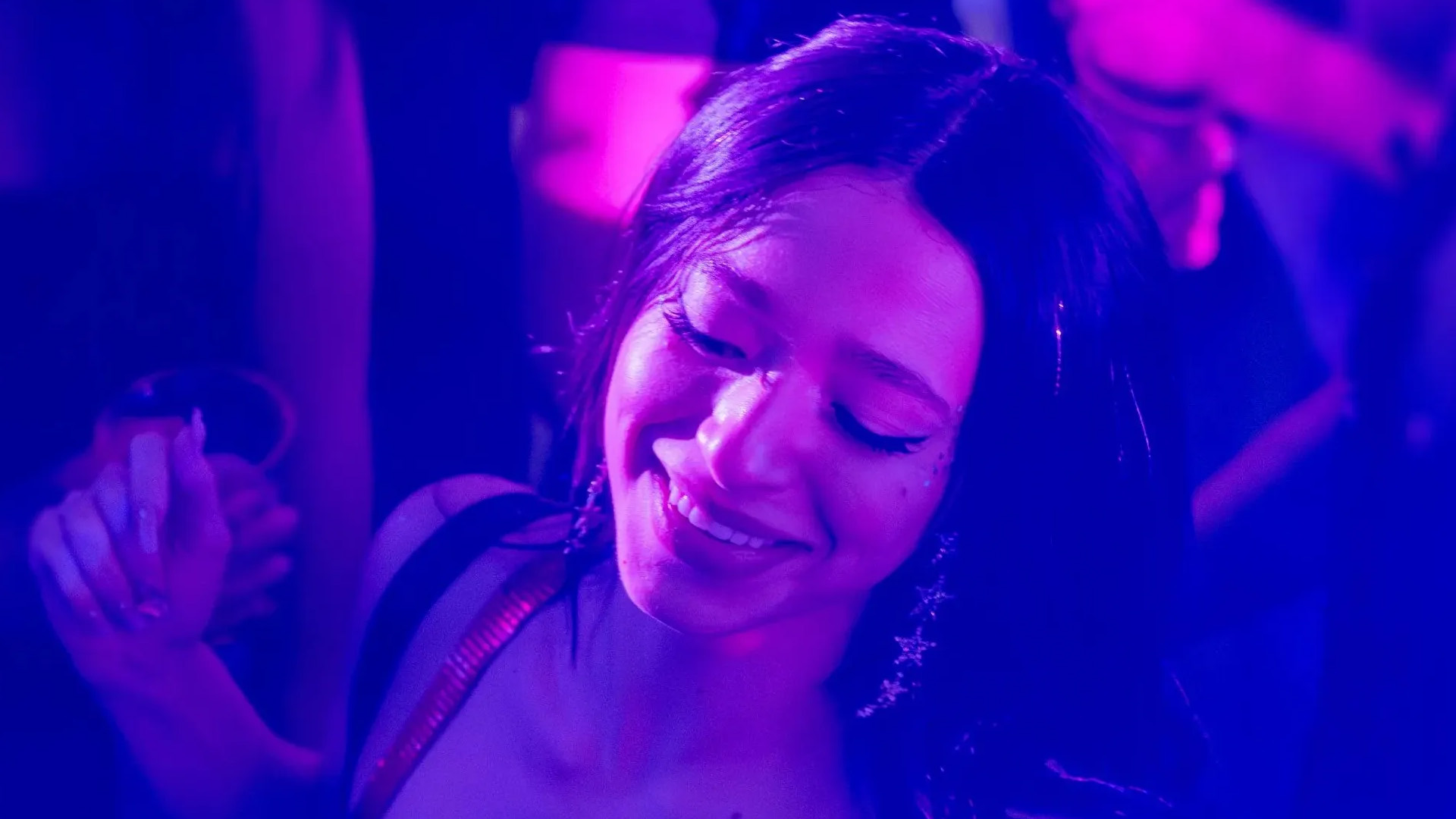Palme d’Or winner Anora moves like a rollercoaster – heaving, powerful and exhilarating

A Brooklyn sex worker (Mikey Madison) and a Russian oligarch’s son fall for each other in Sean Baker’s Palme d’Or-winning Anora. It owes its prize-winning success to how shrewdly Baker taps into the emotional extremes of labour and love, says Rory Doherty.
The last American film to win the Palme d’Or was Terrence Malick’s The Tree of Life, and it’s tough to think of a film less like Sean Baker’s Anora than that. That said, if The Tree of Life opened with a club remix of Take That’s Greatest Day, maybe it would still be winning the Palme d’Or today. As it stands, Anora is a deserving recipient, a class-conscious caper of Ani (Mikey Madison), a Brooklyn sex worker, and Vanya (Mark Eydelshteyn), a Russian oligarch’s heir, falling head over heels for each other. Ani’s fantasy life unfortunately doesn’t last, and her Cassavetes-like journey back to reality is as side-splitting as it is radicalising.
With four of his eight directorial efforts focusing on the pressures of sex work across America, it’s understandable why Sean Baker is most associated with stories set in this one industry. But his most consistent and urgent focus is labour, and the lived experience of working with precarious protections from an exploitative society.
From his frantic depiction of a Chinese delivery driver fighting off loan sharks in Take Out to an impoverished family flogging beauty products at leisure clubs and hotels in the shadow of Disneyworld in The Florida Project, Baker’s films extrapolate on the constant tension defining the lives of people whose worker status is treated extra-punitively.
While the contrast between extreme wealth and the worlds of sex work, poverty, and immigrant labour has always been visible—think of the looming theme parks or oil refineries in the backgrounds of The Florida Project and Red Rocket—the intense, subjective perspective of our marginalised protagonist usually pushes this wealth to the sidelines. This is not the case for Anora, which dives into the absurd and pointless privilege that Vanya has been coddled by his whole life, a 21-year-old living his final months of extravagance (read: video games, strip clubs, and class A narcotics) before his father Nikolay (Aleksey Serebryakov) extracts him back to Russia to work.
It takes a moment for Ani, played with a fierce and volatile energy by Madison, to regard Vanya as something more than a client—but even from their first transactional encounter, she warms somewhat to his immaturity. Despite there being just two years between them, Ani has had to operate in much older circles, and something of the youthful abandon of the Russian playboy singles him out from the middle-aged, middle-class drudgery of her routine cycle of clients. Anora lives and breathes on Madison’s assertive and captivating performance, but Eydelshteyn gives Madison a run for her money in the first act—the surprising sensitivity of his entitled, horny, and ADHD-coded performance sneaks up on you as his elite destiny looms closer.
But before the halfway mark, Anora shifts into a completely different film, announced by the sudden, intrusive arrival of Nikolai’s Armenian goons who have been entrusted with supervising Vanya in America: head honcho Toros (Karren Karagulian), second-in-command Garnick (Vache Tovmasyan), and the bald, meeker Igor (Yura Borisov). Thus begins Anora’s screwball section, where for a good hour Ani is carted around Brighton Beach, Coney Island looking for a missing Vanya in all his usual haunts.
Even with the building comedic momentum (courtesy of the multiple injuries Ani gives the goons) and the clear influence of classic anxiety-primed crime films like The Killing of a Chinese Bookie and Mikey and Nicky, Anora’s extended midsection lacks the immediate, excited appeal of its opening Cinderella romance. But it’s here that the incisive and maddening heart of Baker’s film lies. For an hour, every character who actually holds wealth and power is absent from the narrative, leaving their less stable underlings to clean up on their behalf, with the palpable threat of losing their financial security hanging over them all.
Palme d’Or winner Sean Baker has a nice ring to it. pic.twitter.com/M4CcmwvR7d
— Anora (@AnoraFilm) May 25, 2024
These people are all workers, all dependent on the good favour of elites who are only capable of seeing them as a resource. They all face an equally unjust, heightened threat of exploitation and ostracisation. As the film progresses, our eyes are drawn more to Igor, and how Yura Borisov often silently depicts the henchman’s growing alienation with Vanya’s parents trying to annul his marriage. What do any of them benefit from treating Ani so poorly?
This thread simmers throughout Anora’s chaotic cross-country escapades, underpinning Ani’s unwavering romanticism of her affair with Vanya and gripping your arm tightly through her excruciating attempts to flatter Vanya’s ice-cold mother Galina (Darya Ekamasova). So much of Anora moves like a rollercoaster—a heaving, powerful, and exhilarating progression through ecstasy and anxiety—that Baker’s aptitude for crafting a subjective cinematic perspective risks going unappreciated.
Because so much of Anora concerns itself with the routines and culture of Ani’s sex work, then mirrored by the physical demands of being, well, a thuggish henchman, the peaks of luxury lifestyles and fantasy-like romance take on a different emotional quality than Ani experiences in the moment. It’s not that her affair with Vanya feels, in retrospect, hollow and insincere, but rather tragic.
These crazy kids feel something real for one another, but the intimacy Ani is promised was not given with an equal and balanced share of power. The complex realities of work and romance often boil down to dependency, and Anora owes its prize-winning success to how shrewdly Baker taps into the emotional extremes of labour and love.
Originally published by Flicks on May 29, 2024.



















